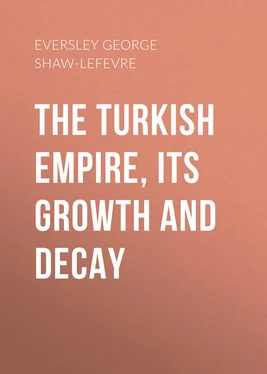George Eversley - The Turkish Empire, its Growth and Decay
Здесь есть возможность читать онлайн «George Eversley - The Turkish Empire, its Growth and Decay» — ознакомительный отрывок электронной книги совершенно бесплатно, а после прочтения отрывка купить полную версию. В некоторых случаях можно слушать аудио, скачать через торрент в формате fb2 и присутствует краткое содержание. Жанр: foreign_antique, foreign_prose, на английском языке. Описание произведения, (предисловие) а так же отзывы посетителей доступны на портале библиотеки ЛибКат.
- Название:The Turkish Empire, its Growth and Decay
- Автор:
- Жанр:
- Год:неизвестен
- ISBN:нет данных
- Рейтинг книги:3 / 5. Голосов: 1
-
Избранное:Добавить в избранное
- Отзывы:
-
Ваша оценка:
- 60
- 1
- 2
- 3
- 4
- 5
The Turkish Empire, its Growth and Decay: краткое содержание, описание и аннотация
Предлагаем к чтению аннотацию, описание, краткое содержание или предисловие (зависит от того, что написал сам автор книги «The Turkish Empire, its Growth and Decay»). Если вы не нашли необходимую информацию о книге — напишите в комментариях, мы постараемся отыскать её.
The Turkish Empire, its Growth and Decay — читать онлайн ознакомительный отрывок
Ниже представлен текст книги, разбитый по страницам. Система сохранения места последней прочитанной страницы, позволяет с удобством читать онлайн бесплатно книгу «The Turkish Empire, its Growth and Decay», без необходимости каждый раз заново искать на чём Вы остановились. Поставьте закладку, и сможете в любой момент перейти на страницу, на которой закончили чтение.
Интервал:
Закладка:
Lord Eversley
The Turkish Empire, its Growth and Decay
PREFACE
The favour with which, two years ago, my book on The Partitions of Poland was received by the public has induced me to devote the interval to a study of the history of another State which, in modern times, has almost disappeared from the map of Europe – namely Turkey.
The subject is one in which I have for many years past taken great interest. In the course of a long life, I have witnessed the greater part of the events which have resulted in the loss to that State of all its Christian provinces in Europe and all its Moslem provinces in Africa, leaving to it only its capital and a small part of Thrace in Europe, and its still wide possessions in Asia.
So long ago, also, as in 1855 and 1857, I spent some time at Constantinople and travelled in Bulgaria and Greece, and was able to appreciate the effects of Turkish rule. As a result, I gave a full support, in 1876, to Mr. Gladstone in his efforts to secure the independence of Bulgaria, and in 1879 was an active member of a committee, presided over by Lord Rosebery, which had for its object the extension of the kingdom of Greece so as to include the provinces inhabited by Greeks still suffering under Turkish rule.
In 1887 and 1890 I again visited the East and travelled over the same ground as thirty years earlier, and was able to observe the immense improvements which had been effected in the provinces that had gained independence, and how little change had taken place at Constantinople.
In view of these experiences and of the further great changes portended in Turkey after the conclusion of the present great war, I have thought it may be of use to tell, in a compact and popular form, the story of the growth and decay of the Turkish Empire.
History may well be told at many different lengths and from different points of view. That of the Ottoman Empire, from the accession of Othman in 1288 to the treaty of Kainardji in 1774, which secured to Russia a virtual protectorate in favour of the Christian subjects of Turkey, has been told at its greatest length by the German professor, Von Hammer, in eighteen volumes. He is the only historian who has explored for this long period both Greek and Turkish annals.
The British historian, Knolles, writing in 1610, told the story of the growth of the Turkish Empire in two bulky folio volumes, much admired by two such different authorities as Dr. Johnson and Lord Byron. The work is based on a few only of the Greek annals. It is very discursive and imperfect, but it contains many most terse and striking passages. Gibbon, the historian of the Roman Empire, and Sir Edwin Pears, in his most interesting book on the Destruction of the Greek Empire, have also relied on Greek authorities up to the capture of Constantinople by the Turks in 1453, before which date there were no Turkish historians. Very recently, in 1916, Mr. Herbert Gibbons, of the Princeton University, published a very valuable work on the foundations of the Ottoman Empire, dealing with its first four great Sultans. He has again examined with very great care the numerous and conflicting early Greek authorities, and has thrown much new light on the subject.
Other historians of Turkey, writing in English and French, such as Creasy, Lane Poole, La Jonquière, and Halil Ganem (a Young Turk), have drawn their facts mainly from Von Hammer’s great work. Their books are all of interest and value. But these writers, and especially Sir Edward Creasy, in his otherwise admirable History of the Ottoman Empire , written at the time of the Crimean War, to which I have been much indebted, took what would now be considered too favourable a view of Turkish rule in modern times, and were over sanguine, as events have shown, as to the maintenance and regeneration of the Empire. I have followed their example in basing my narrative mainly on Von Hammer’s work, correcting it in some important respects from the other sources I have named, compressing it into much smaller compass than they have done, treating it from a somewhat different point of view, and bringing it down to the commencement of the present great war in 1914.
It would have been easier to tell the story at double the length, so as to include much other important and interesting matter, but, in such a case, the lesson to be drawn from it would have been obscured by the maze of detail. My book does not aim at a full history of the long period dealt with. I have proposed only to explain the process by which the Turkish Empire was aggregated by its first ten great Sultans, and has since been, in great part, dismembered under their twenty-five degenerate successors, and to assign causes for these two great historic movements.
I will only add that I commenced my recent studies under the impressions derived in part from some of the histories to which I have referred and with which I was familiar, and in part from the common tradition in Western Europe – dating probably from the time of the Crusaders – that the Turkish invasions and conquests in Europe were impelled by religious zeal and fervour and by the desire to spread Islam. I have ended them with the conviction that there was no missionary zeal whatever for Islam in the Turkish armies and their leaders who invaded Europe, and that their main incentive was the hope of plunder by the sack of cities, the sale of captives as slaves or for harems, and the confiscation of land and its distribution among soldiers as a reward for bravery. I have also concluded that the decay of the military spirit and the shrinkage of Empire was largely due to the absence of these motives and rewards when the Turks were on the defensive.
If I have expressed my views freely on this subject, and on the misrule of the Turks in modern times, I have endeavoured to state the facts on which they are based with perfect fairness as between the Crescent and the Cross.
I have purposely refrained from expressing an opinion as to the future of Turkey, after the conclusion of the existing great war. The problems which will then have to be solved are of a different order to those of the past which have been dealt with in this book. The Turkish Empire, in the sense of the rule of an alien race over subject races, has practically ceased to exist in Europe. It survives in Asia and at its capital, Constantinople, under very different conditions.
With respect to the numerous works I have consulted for the latter part of my book, I desire specially to acknowledge my indebtedness to Mr. Lane Poole’s admirable Life of Lord Stratford de Redcliffe .
I have to thank Lord Bryce, Lord Fitzmaurice, and Sir Edwin Pears for their valuable suggestions, and Lady Byles and Mr. Laurence Chubb for their kind help.
E. June 1, 1917.PART I
THE GROWTH OF EMPIRE
I
OTHMAN
1288-1326
Towards the middle of the thirteenth century a small band or tribe of nomad Turks migrated from Khorassan, in Central Asia, into Asia Minor. They were part of a much larger body, variously estimated at from two to four thousand horsemen, who, with their families, had fled from their homes in Khorassan under Solyman Shah. They had been driven thence by an invading horde of Mongols from farther east. They hoped to find asylum in Asia Minor. They crossed into Armenia and spent some years in the neighbourhood of Erzerum, plundering the natives there. When the wave of Mongols had spent its force, they proposed to return to Khorassan. On reaching the Euphrates River Solyman, when trying, on horseback, to find a ford, was carried away by the current and drowned. This was reckoned as a bad omen by many of his followers. Two of his sons, with a majority of them, either returned to Central Asia or dispersed on the way there.
Читать дальшеИнтервал:
Закладка:
Похожие книги на «The Turkish Empire, its Growth and Decay»
Представляем Вашему вниманию похожие книги на «The Turkish Empire, its Growth and Decay» списком для выбора. Мы отобрали схожую по названию и смыслу литературу в надежде предоставить читателям больше вариантов отыскать новые, интересные, ещё непрочитанные произведения.
Обсуждение, отзывы о книге «The Turkish Empire, its Growth and Decay» и просто собственные мнения читателей. Оставьте ваши комментарии, напишите, что Вы думаете о произведении, его смысле или главных героях. Укажите что конкретно понравилось, а что нет, и почему Вы так считаете.












